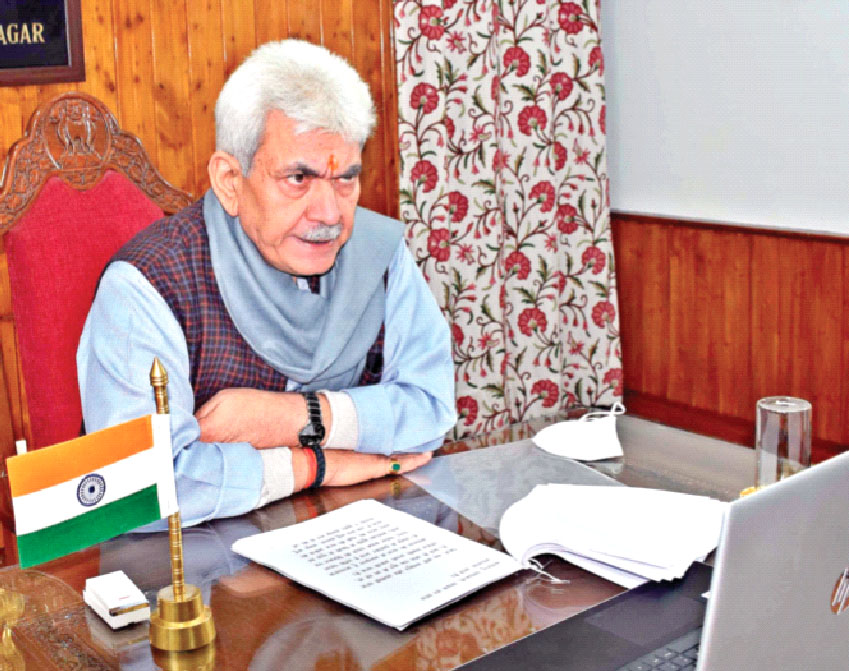
Expressing happiness over the high voter turnout in Jammu & Kashmir District Development Council polls Lieutenant-Governor Shri Manoj Sinha says, “The polls have helped build an atmosphere of mutual trust among people of J&K.” For him, development of J&K is his ‘only priority’, and for that, he is focusing on the delivery of services and effective implementation of welfare schemes. In an exclusive interview with Senior Correspondent Nishant Kr Azad at the Raj Bhawan in Jammu, Shri Sinha spoke on a range of issues, including security dynamics and a roadmap for economic revival. Excerpts:
It’s more than four months that you have been appointed as the L-G of Jammu & Kashmir. How has been your experience?
I have visited ten divisions of Kashmir and six of Jammu. I am yet to visit the rest of the four. I realised that people’s expectations were not fulfilled. The need of the hour is to provide a platform for them. All Deputy Commissioners and Superintendents of Police were given instructions to meet the civilians daily for an hour excluding (Wednesday and Sunday) and listen to their issues. Similar instructions were given to the IGs, Divisional Commissioners who also meet people twice a week. Earlier the major focus used to be on construction activities only, whereas the other schemes of both the Centre and the State were not much saturated.
Under the 21-day public awareness programme, it was realised that various welfare schemes need to be 100% saturation, which include both 54 schemes of the Centre and other schemes of the State. I am glad to inform you that in 16-17 districts, the saturation has reached almost 100%, whereas, in the rest of the districts, it has touched around 85%, where we intend to make it to 100%.
Then comes the issue— where will an average citizen approach to redress his grievances? For that, we have devised an institutionalised mechanism of ‘Grievance Redressal’. It is directly linked to the Government of India’s redressal mechanism, probably the first of its kind. I have personally met people twice. Once a month, I interact with aggrieved persons and keep in touch with senior administrative officers such as the District Collector, SP, and others to resolve the issue as early as possible. Now, the percentage of grievance redressal has increased. People have realised this to be a platform that will help in grievance redressal.
What is your assessment of the security scenario in J&K?
Security is not a concern. The security mechanism of J&K is extremely good, where entire security forces — the Army, the BSF and J&K Police — have brilliant coordination among them. A significant change is that J&K Police is now deployed full time on the front and fights there.
On the border, ceasefire violation from Pakistan and cross border infiltration have increased, and China on the other front is also emerging as a great security threat. How do you see this?
The argument is not factually correct. Some attempts of infiltration were made recently, but due to the alertness of the Army, BSF and J&K Police, all such attempts were foiled. Talking about our neighbour, it obviously doesn’t like the democratic exercise going on in J&K and will attempt to disrupt it. China doesn’t share its border with J&K anymore. Therefore, I can’t comment on that. Moreover, it’s a matter of international relations about which only the Government of India, Ministry of External Affairs and the Ministry of Defence are authorised to speak.
When you were appointed as the L-G of J&K, it was said that you would make proper security arrangements for political leaders. What are the arrangements being made for the same?
After I was appointed as the L-G, the killings of political personalities have almost stopped. Our efforts are to provide adequate security arrangements to those whose lives are in danger and protect everyone in the State.
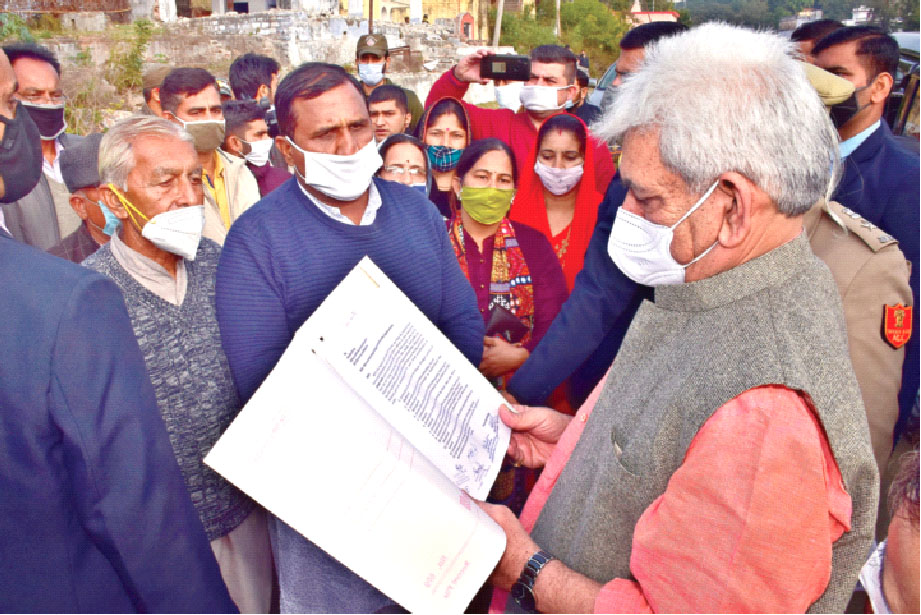
Lt Governor Interacting with locals at Purmandal
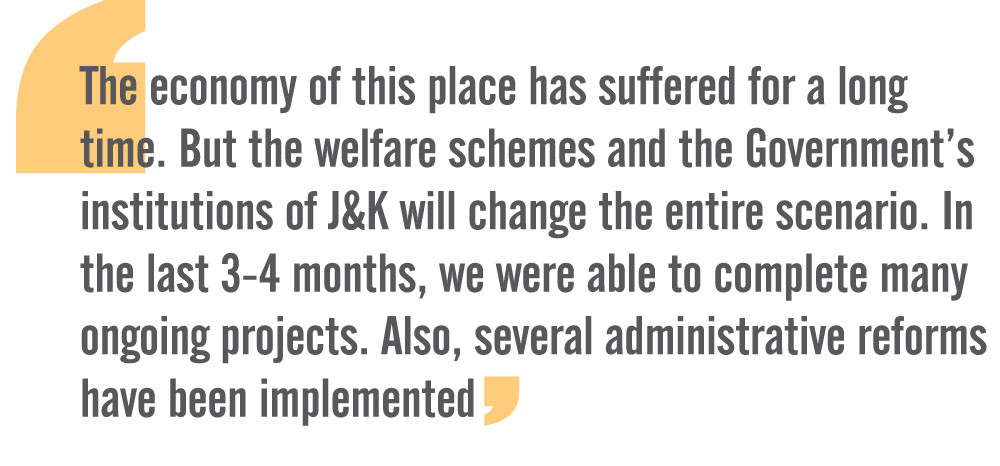
After the abrogation of Article 370, what are the steps being taken by the Government to ensure the development of J&K?
The COVID-19 pandemic has affected the UT like the rest of the country. The economy of this place has suffered for a long time. But the welfare schemes and the Government’s institutions of J&K will change the entire scenario. In the last 3-4 months, we were able to complete many ongoing projects. Also, several administrative reforms have been implemented. Infrastructure projects take some time to finish, but we are currently working on constructing AIIMS, IITs, IIMs, four-lane highways in the UT. The work for all the projects is going on rapidly and being regularly reviewed by me. Most of these projects will be finished in a period of almost two years, and then we will be able to see the changed situation. The Budget allocated to J&K is over Rs 1 lakh crore, which is way higher than any other State receiving funds from the Indian Government. It will boost economic revival.
Corruption and lack of transparency were a sensitive issue in J&K as it was alleged that large-scale corruption in the usage of funds received from the Centre. What is the Government doing to bring in transparency?
We have a zero-tolerance policy towards corruption. The increasing use of technology will facilitate in countering corruption. Thus we are using the technological tools to remove corruption from the system. All the development works being done by us are uploaded in the public domain so that the people know about them and give their feedback as to whether they are getting the benefits or not. Earlier there was no anti-corruption bureau, but now there is. Many corrupt people have also been arrested. Thus, now there’s a consensus being created that corruption will not be tolerated anymore.
There was an expectation that you would initiate political dialogue with Valley-based parties. What is the progress on that front?
I am always ready for that. I have already met politicians of all hues. Also, I have interacted with people. For the first time, DDC elections were organised in the UT. Parliament passed the Panchayati Raj Act in the year 1992, but Jammu & Kashmir had a two-tier system instead of three, as DDC had never elected representatives which we amended. Compared to the voting percentage of earlier elections, the voter turnout has increased in Kashmir Valley in which women, youth and aged people have enthusiastically participated. Thus, the amendments were necessary for strengthening grassroots democracy, as people will participate in the development journey.
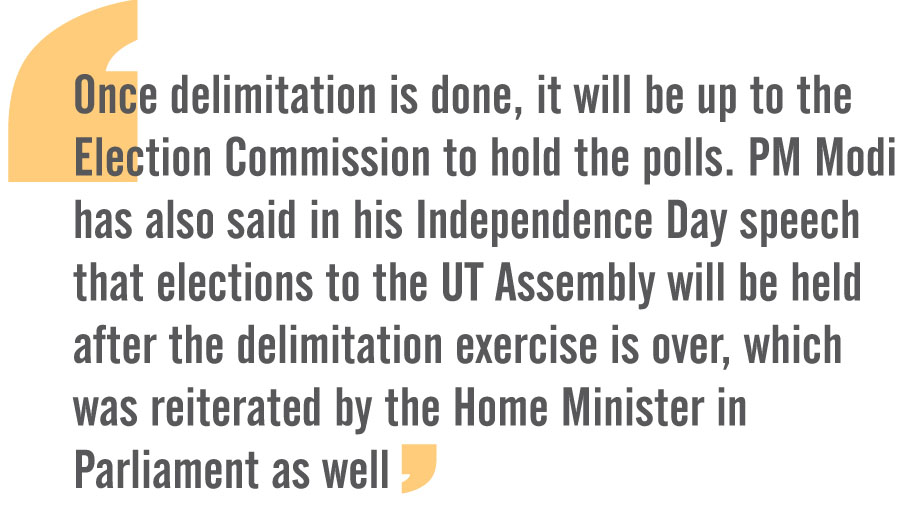
We did a programme named ‘Back to Village’, in which we used to visit a village daily. The visiting officer used to stay for two nights in the village. The village Panchayats receive funding of MNREGA and welfare schemes of the Centre. Apart from that, we gave Rs 5-10 lakh as incentives to the Gram Panchayats, in which the people will decide what kind of development works to do. The visiting officer would only facilitate things. In some cases, the only suggestion given by us was to buy sports kit worth Rs 20,000 for youth. In some other occasions, we suggested the visiting officer to identify two youth of the village who have entrepreneurship skills and incentivise their enterprises. There are 4,290 Gram Panchayats in J&K. We aim to encourage almost 12,000 such young entrepreneurs by giving a monetary incentive up to Rs 10 lakh from Jammu & Kashmir Bank. After this ‘Back to Village’ programme was over, people from urban areas approached us and urged that such initiatives must be done for urban people as well. Thus, we organised a similar initiative for the urban population and gave Rs 1-5 crore to some of the Nagar Palikas and Municipal Corporations. Thus, an atmosphere of mutual trust has been built amongst people, and now they think that by getting elected in the DDC, they can contribute to develop their districts and towns.
So we can say that such programmes are aimed at making the youth and women of J&K the major stakeholder in decision making?
We aim to make every citizen the stakeholder. Youth and women are our priority.
DDC elections are over now. When can we expect Assembly polls in J&K?
Once delimitation is done, it will be up to the Election Commission to hold the polls. Delimitation is a constitutional exercise. It’s happening not just in J&K but in some of the North-Eastern states as well. The Election Commission will speak on the issue when the right time comes. In his Independence Day address from the Red Fort, the Prime Minister has said that elections to the State Assembly will be held after the delimitation exercise is over, which was reiterated by the Home Minister in Parliament as well.
How do you see the future of separatist forces?
No kind of separatist politics has a place in J&K.
Now, as separatist forces have become silent, Gupkar Alliance is clamouring for restoration of Article 370. Farooq Abdullah even went to the extent of seeking help of China and Pakistan to re-instate Article 370. What’s your opinion on that?
The Constitution of India gives freedom of expression to the citizens; thus, anyone has the right to speak their mind. It doesn’t matter much. But those who have taken official oath under the Constitution at any point of time must keep in mind the authority of the Constitution.
Unemployment has been an important issue in J&K, with 65% of its population being youth. The Prime Minister and Home Minister said the revocation of Article 370 would lead J&K on the path of development and create employment opportunities. What are the plans to address the issue?
Unemployment is a problem not just for J&K: It’s an issue for the rest of India as well as the world. The number of government employees here is the same as in Bihar though the latter’s population is 11 times more. Apart from government service, other options for employment were never thought of in the last seven decades. We are working to fill the vacant 12,000 posts in the government sector; examinations are also being conducted. Government jobs alone can’t solve the issue of unemployment; thus, we have devised an industrial policy for the UT, which has been approved by DIPP, Ministry of Finance – Government of India. I am hopeful that in the coming 2-3 years, the UT will receive an investment of almost Rs 30,000 crore. We organised a one-day programme in Srinagar, which was attended by the leading personalities from across India active in academia, social sector, industrialists, and NITI Aayog. Tata Group has started a centre in Baramulla, and we plan to set up another centre at Jammu in January. The motor institute is being developed as part of skill development. ICICI Bank has started a centre at Jammu, and next is going to come up at Anantnag. We aim to create a skill force in the UT. We are hopeful that more than 80% of youth of the UT will get employment opportunities in the near future.
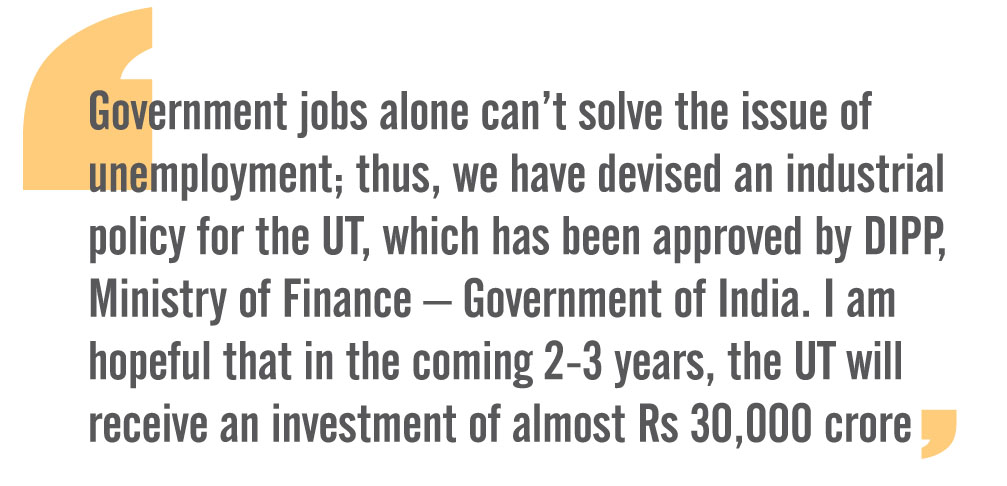
What are the plans for the development of the population of the State residing in the border areas?
It’s unfortunate for our nation that we didn’t develop the areas situated near the border in the last seven decades. But over the previous six years, notable work has been done for the infrastructure development in the border areas. Tunnels which were unimaginable to be constructed in the past are being made. For the vulnerable communities residing near the border like Gujjar and Bakarwal, we have implemented the Forest Act and have notified that they will get land by March 31 next year. Arrangements are being made so that people from border areas get recruited in the para-military forces. Skill mapping programmes are being conducted in the border areas so that the youth in these areas and can be reskilled and facilitate in their employment opportunities.
The issue of Kashmiri Pandits is a sensitive topic in the Kashmir debate. What are the steps being planned for their re-settlement in the Valley?
We have planned to earmark 6,000 posts in the Government and construct 6,000 houses for them. This was intended long before and announced by the Prime Minister himself, but unfortunately, its implementation got delayed. I want to assure that apart from the 164 jobs, all the posts will be filled by the Pandits. We have already issued a tender for constructing the 3,500 houses for the Pandit community and plan to issue a tender for the rest soon. We aim to make 6,000 houses in the next two years and will solve their issue by re-settling them.
Rohingyas are considered a security threat for the State. What do you have to say on this?
We will deal with all kinds of threats.
How have you adapted from being a long-time political activist to the constitutional head of India’s most sensitive border territory?
I have to fulfil my responsibility as per the rules and regulations laid by the Indian Constitution. My past experiences will come in handy in executing my present responsibilities.



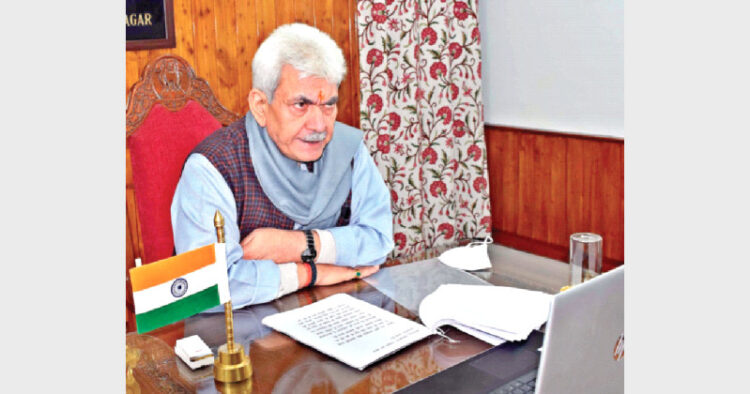










Comments